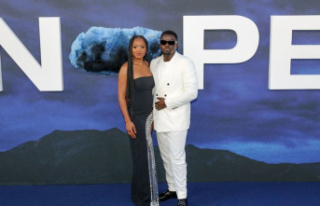"I apologize to the people of Burkina Faso for all the acts that I may have committed during my magisterium and more particularly to the family of my brother and friend Thomas Sankara", indicates the former head of state in a message read by Burkinabè government spokesman Lionel Bilgo.
"I assume and deplore from the bottom of my heart, all the suffering and drama experienced by all the victims during my mandates at the head of the country and ask their families to grant me their forgiveness", continues Mr. Compaoré.
Blaise Compaoré, 71, came to power in 1987 following a putsch that cost the life of then-president Thomas Sankara, a pan-African icon with "progressive" ideas, of whom he was a close friend before he died. he is killed.
In April, the Ouagadougou military court had sentenced him in absentia to life imprisonment for his role in this assassination, after a river trial of six months.
The death of Thomas Sankara, who wanted to "decolonize mentalities" and upset the world order by defending the poor and oppressed, was a taboo subject during Mr. Compaoré's 27 years in power.
"It's a masquerade (...) a form of diversion that he (Compaoré, editor's note) sows in the minds of people", reacted Luc Damiba, secretary general of the International Committee of the Thomas Sankara Memorial, believing that these apologies are made "to allow him to return to Burkina and have a presidential pardon".
Knocked down by the street in 2014, Blaise Compaoré has since lived in Côte d'Ivoire, but was able to return briefly to his country for a few days in early July without being arrested.
In his message, he thanked Ivorian President Alassane Ouattara for facilitating this return.
- "Sacred Union" -
He was invited by Lieutenant-Colonel Paul-Henri Sandaogo Damiba, current transitional president who came to power in a coup in January, with the aim of "sealing national reconciliation" with former heads of state. burkinabè in the face of the jihadist attacks that are mourning the country.
After meeting the new strongman of the country, Mr. Compaoré appeared emaciated at his side.
This visit had aroused a shower of criticism within the political class and civil society who felt that reconciliation should not be synonymous with impunity.
Expressing "his deep gratitude" to the transitional authorities, Mr. Compaoré called in his message on Tuesday the Burkinabè "for a sacred union, for tolerance, for restraint, but above all for forgiveness so that the higher interest of the Nation prevails. ".
“Our country, Burkina Faso, has been going through one of the most serious crises in its history for several years, which threatens it to its very existence. This nation deserves better than the disastrous fate that terrorists want to reserve for it,” said he continued.
Mr. Compaoré is accused of having made a pact with armed groups in order to protect his country from jihadist attacks during his years in power.
Since its fall in October 2014, Burkina Faso has been plunged into a serious security crisis marked by increasingly deadly jihadist attacks, particularly in the north and east of the country.
On January 24, Lieutenant-Colonel Damiba overthrew elected President Roch Marc Christian Kaboré, made unpopular by his "powerlessness" in the face of insecurity.
But the putschists were quickly confronted in turn with bloody attacks, like the massacre of 86 civilians in Seytenga (north) in June.
The violence, attributed to armed jihadist movements affiliated with Al-Qaeda and the Islamic State group, has left thousands dead and nearly two million displaced in Burkina Faso since 2015.












